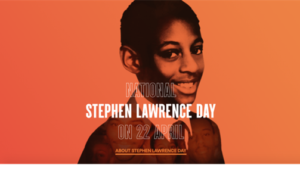Source of image: University of Liverpool website
Every year on April 22nd, we mark Stephen Lawrence Day, the day Stephen was brutally murdered in a racist attack while waiting for a bus in South East London. Despite knowing who the perpetrators were, it took nearly 20 years for justice to be served. This catastrophic failure of the police and justice system to respond appropriately and charging Stephen’s killers highlighted the racism that existed and continues to exist in the institutions within society today.
Racism is not just individual, it’s structural, systemic. It is also embedded in many institutions via laws, policies, practices, and cultural norms that continue to disadvantage marginalised communities while upholding privilege for others. It shows up in everything from biased hiring processes and racially impacted health outcomes to white-centered curriculum content, racial profiling and policing strategies based on bias. Even when one person isn’t being explicitly racist, the systems in place can still produce unjust, racist results. This is why tackling racism requires more than good intentions, it demands a critical look at the structures we operate within, and the need to rebuild these systems in truly equitable ways.
Being anti-racist is an active, ongoing commitment to identifying, challenging, and dismantling racism. A crucial part of this work is acknowledging our own biases. These are the unconscious ideas and assumptions we’ve absorbed from the world around us. We are all biased and ignoring this allows discrimination to go unchecked. By recognising our biases, we begin the important work of unlearning and listening, to the experiences of people of colour. Anti-racism requires us to step out of our norms and into accountability, ensuring that our actions move us closer to justice, inclusion, and true equity for all.
To continue to educate ourselves on anti-racist practice we must engage with books, articles, podcasts, and other resources created by authors and people of colour whose lived experiences offer critical insights into the realities of racism. Anti-racist education also requires deep personal reflection of our own identities, privileges, and biases. We must recognise how they shape our thinking and actions. Tools like implicit bias tests, journaling, and guided discussions can support this self-awareness. Meaningful learning also happens through active listening to the voices of those impacted by racism, without defensiveness or the need to centre whiteness. Attending workshops, seeking out training, and participating in open, honest conversations are key steps to becoming anti-racist.
Most importantly, anti-racist learning must lead to action. This starts with challenging discrimination when we see it, advocating for equity in our communities and workplaces, and holding ourselves and others accountable. Anti-racism is a lifelong commitment to justice, inclusion, and systemic change.
Every one of us has a role to play in creating a more just and inclusive society, regardless of whether we work in society’s big institutions or not. Reflecting on your role means understanding that influence doesn’t only come from positions of power it can also come from everyday interactions, choices, and conversations. Whether you are a teacher, a policy maker, a parent or none of the above your words and actions matter. We must speak up against discrimination, and uplift those whose voices are often silenced.
Reflecting on our role in creating an anti-racist society means recognising the influence we have within your circles, communities, workplaces, and relationships. Whether it’s advocating for fairer policies at work, or continuing to educate ourselves, our choices make a difference. When we each commit to using our voice, platform, or privilege we become part of the solution to create meaningful, lasting change and eradicate racism. Stephen Lawrence would have been 50 this year. We can remember him by actively choosing anti-racist practice. Let’s honour his memory not just with words but with action.
Categories: Blogs
